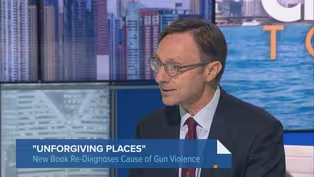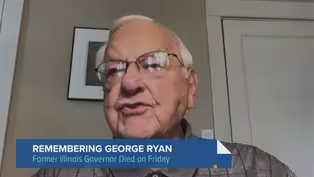
Chicago Groups Feeling the Impact of AmeriCorps Cuts
Clip: 5/5/2025 | 9m 42sVideo has Closed Captions
AmeriCorps was directed to terminate nearly $400 million in grants.
The federal agency tasked with dispatching more than 200,000 workers to serve at local organizations across the country is the latest to face cuts under the Trump administration.
Problems playing video? | Closed Captioning Feedback
Problems playing video? | Closed Captioning Feedback
Chicago Tonight is a local public television program presented by WTTW
WTTW video streaming support provided by members and sponsors.

Chicago Groups Feeling the Impact of AmeriCorps Cuts
Clip: 5/5/2025 | 9m 42sVideo has Closed Captions
The federal agency tasked with dispatching more than 200,000 workers to serve at local organizations across the country is the latest to face cuts under the Trump administration.
Problems playing video? | Closed Captioning Feedback
How to Watch Chicago Tonight
Chicago Tonight is available to stream on pbs.org and the free PBS App, available on iPhone, Apple TV, Android TV, Android smartphones, Amazon Fire TV, Amazon Fire Tablet, Roku, Samsung Smart TV, and Vizio.

WTTW News Explains
In this Emmy Award-winning series, WTTW News tackles your questions — big and small — about life in the Chicago area. Our video animations guide you through local government, city history, public utilities and everything in between.Providing Support for PBS.org
Learn Moreabout PBS online sponsorship>> The federal agency tasked with dispatching more than 200,000 workers to serve at local organizations across the country is the latest to face cuts under the Trump administration.
Americorps was directed to terminate nearly 400 million dollars in grants.
Roughly 34 million of which are invested in Illinois.
Local organizations are speaking out saying the decision will have serious consequences for volunteers and communities.
Joining us now are Patricia Rivera, the founder of Chicago hopes for kids which supports students and families experiencing homelessness.
Row, the president of a safe Haven, a group that offers comprehensive approaches to addressing homelessness.
And via zoom marked pain, the executive director of public Allies, Chicago, which helps underrepresented emerging leaders with pathways to education and careers.
Thanks to all of you for joining us.
Row.
Starting with you first, please.
How do organizations like yours use the AmeriCorps program to support your work?
>> So the programs for important her work as it.
Provides us with services firm professionals who are dedicating up to a year their time sometimes to your at times to help build capacity for not-for-profit foundations.
So put quite simply.
They come in and they do work that we otherwise would not be able to get done.
Because we can afford the position funding for that position would not be available to our general revenue funding.
So it's really a great program that allowed of in our organization.
We had master level.
Americorps volunteers coming in, helping build tools to better serve our clients stay.
We're working on HR program say we're working on there are ways to define the metrics of how we serve people and understanding how those those services had impact on individual lives.
>> You've said this will have a domino effect in communities.
How so?
they're just taking a look at stake in the slash-and-burn attitude towards the position that >> saying, well, we're paying for this resource to this agency.
Won't.
The agency is a not-for-profit foundation that brings homeless services treatment house saying and job training to individuals.
These individuals are working on key program.
So make us that will build our capacity do that better to provide better services have a better service delivery system.
Overall.
And it allows us to explore projects that we otherwise could not do.
>> What other benefits are there to organizations that bring on AmeriCorps workers when it comes to budgeting resources.
>> But you resort I mean that that's the largest.
I mean, some of these individuals we could not afford to bring on.
I mean, quite quite honestly, it We've had graduate level students come in that are taking a year off of their career path to come in to make a social impact.
They don't work for a lot of money.
They work for a stipend.
So for when we take a look at the state, we're building program stat.
Trickle down to the community.
They were helping those resources that trickle down to the community.
Most are resources that we we couldn't do without or without kind of program you do with Patricia Rivera, how are volunteers that Chicago hopes for kids responding to this?
>> Ok, well, we have a different type of volunteer.
They're a direct service volunteer through the national and state program.
And those volunteers are able to do direct service with students.
So are program mainly focuses on providing after school help, especially in literacy and enrichment for children who are experiencing homelessness.
We actually going to homeless shelters and the AmeriCorps members often our one on one with the student helping them improve their literacy skills, helping them do their homework.
And then providing a Richmond activities for the children.
So we have a group of students up to maybe 15 with AmeriCorps volunteers who are there usually for afternoons a week working with students as well as community volunteers.
But the mayor, of course, people were really helping us with that direct service every single day to provide consistency to the children.
They also get training in trauma, informed care because these are children who have had experiences with homelessness, which is really extremely difficult and, you know, it's kind of an emotional.
What do I want to say?
Emotional time for the kids in terms of trying to fit into a new school, sometimes to a new place where they don't have anything that they've had before.
So if volunteers are experiencing cut says Yorick organization, you able to to help them in any way and without them, then what happens?
>> Of all those services that you just named that are not being provided?
Well, we have to really changed.
>> The way we focus our program.
We still want to provide literacy services, but it won't be one-on-one.
Maybe it would be small groups will have to get a lot more community volunteers in the past before we had an AmeriCorps program, we were not able to provide the consistency that really has really helped him pack the children and help them do much better in school.
We've had volunteers that have only been able to give us like one afternoon a week rather than for afternoons a week.
We'll also have to really change our summer program because that really depends on our direct service volunteers.
We're going to try and get more community volunteers and we actually depend on our board as well to help us out during this time.
Hopefully I imagine recruiting recruiting community volunteers.
That's that's another project, which means and your staff would have to take Mark Payne, you're an alum of the program.
What drives someone to sign up to become an AmeriCorps volunteer?
>> Thank I am the law mom and a long, proud alum of a 1996 public allies.
Chicago has been around since 1993. and since 1993, we have graduated over 1000 diversion leaders.
So we have 1000 alone in the city from our program in the city of Chicago and represented over 400 nonprofits.
So what would drive somebody to say that they care about the civic life of Chicago that they want to serve and lead Chicago.
So that's what drives And we care about our neighborhoods.
We care that we look at neighborhoods from the asset based lands.
We care about schools.
We care about health clinics and we care about leaders that you normally would not think would be leaders need that extra step.
That's why people join public allies.
Chicago.
>> And what it one of the volunteers themselves, what they take away from the experience with the game.
>> You know, they First of all, they game one day serve nonprofit or government agency for 10 months.
And so for 4 days a week they serve under leaders, leaders who are working every day to make changes.
Systemic changes in Chicago.
And during that time they work in schools.
They work in health clinics and they take away how to learn about budgets.
They learn about integrity, learn about asset base, work to learn about public safety, public health.
It's an organization that really focuses on the skills, the gifts that you need to become a leader in serve Chicago in a lot of our allies.
They serve nationwide.
We have 10,000 nationwide, our CEO Denise Tyrrell is doing an amazing job of continuing so of continuing this program and making sure that is strong and it was a redundant founded by Michelle Obama.
>> As well.
And so I want to I want to asking question because we've not a lot of lawsuits challenging the Trump administration's executive orders.
>> is there any recourse for AmeriCorps?
What have you heard anything yet?
We've seen a lot of lawsuits varying varying organizations knee a cheese stages are filing lawsuits because, you know, 3rd of executive branch's ability.
>> To cut this program, a congressionally funded program at debate across the board all over.
>> And so you're going to see a lot more lawsuits.
Team Kelly prompt as the impact to the organizations waiting for those lawsuits to work their way through or just even re-engage these individuals to get this point is the damage already done?
If if you've had to let go of your volunteers, the damage is done.
But mean, I think another thing that was brought is that.
>> Volunteers who comments sometimes go into the field after working in AmeriCorps four-year to 10 months hurt here.
Sometimes state become the new leaders in the field.
And I in that whole aspect was totally that gets totally lost.
When you do something like this because now they individuals who would consider doing it may not think it's a viable program be able to rely on Patricia.
We've got about 20 seconds left.
What's next for you all as you navigate this?
Well, we're really concerned about the children.
So what we want to do is get our community volunteers together and see what we can do.
>> To continue.
The programming were also been a support.
Anything that can be done on a state or national level to try and bring the funding back, OK, that's where
New Book Examines Causes of Gun Violence
Video has Closed Captions
Clip: 5/5/2025 | 8m 28s | The U.S. gun homicide rate is 26 times higher than other developed countries. (8m 28s)
Remembering George Ryan, Ex-Governor With Complicated Legacy
Video has Closed Captions
Clip: 5/5/2025 | 2m 31s | The former governor died Friday at his home. He was 91. (2m 31s)
Providing Support for PBS.org
Learn Moreabout PBS online sponsorshipSupport for PBS provided by:
Chicago Tonight is a local public television program presented by WTTW
WTTW video streaming support provided by members and sponsors.













